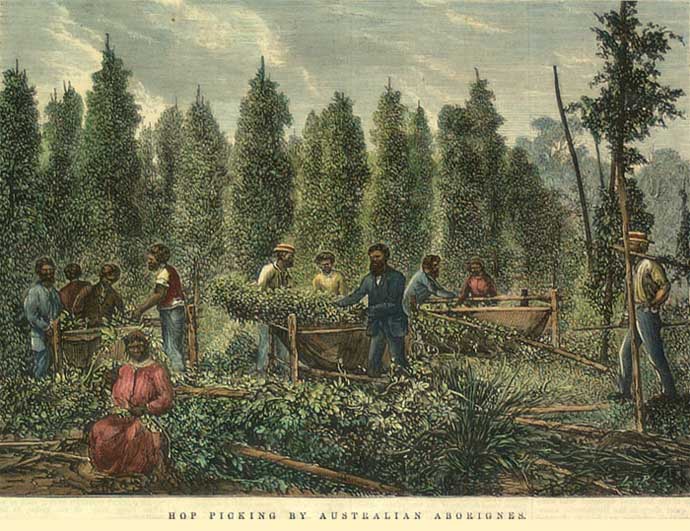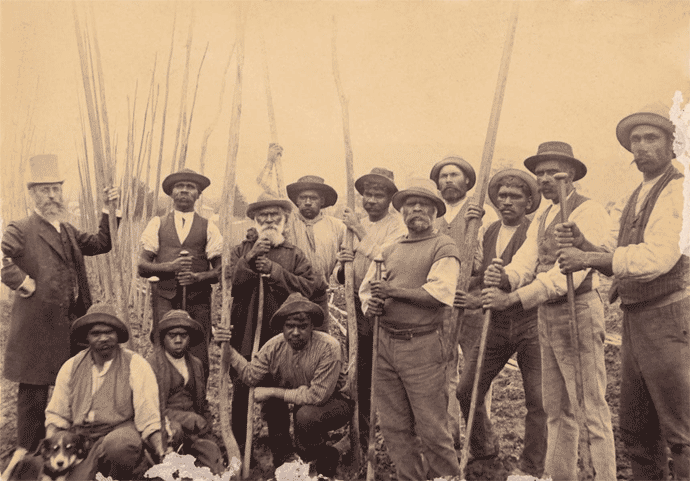Coranderrk: First Nations Farmers and Market Gardeners
AUDIO: Coranderrk with Phillip Adams 'Late Night Live' ABC Radio Nation
This successful Aboriginal enterprise was destroyed by government legislation believed to be prompted by the jealousy of white settlers. The main workforce was forced off the land and the land later handed to 'white soldiers setters' as Soldier Settlement blocks. Even though some of these Aboriginal people served in the war, no Aboriginal servicemen were eligible for these government land hand-outs in Victoria.
 The successful Coranderrk hop farm - Published in 'The Illustrated Australian News', May 1872
The successful Coranderrk hop farm - Published in 'The Illustrated Australian News', May 1872(Culture-Victoria collection)
Coranderrk, Victoria, was an early First Nations mission station set up in 1863, the station ran successfully for many years as an 'aboriginal' enterprise selling wheat, hops and crafts to the growing market of Melbourne. The produce from the farm won first prize at the Melbourne International Exhibition in 1872.
Jack Charles talks about Coranderrk; their political stance and his connection.
By 1874 the 'Aboriginal Protection Board' were looking at ways to undermine Coranderrk by moving people away to Lake Tyers Mission, due to their successful farming practices. The general community also wanted the mission closed as the land was too valuable for Aboriginal people.
Five older people refused to move and continued living there until they died. James Wandin was the last person born at Coranderrk Station, in 1933, in the home of his grandmother, Jemima Wandin.

Putting in poles for their prize winning hops in Coranderrk gardens.
William Barak in back row, third from left. Circa late 1800s - early 1900s
In February 1859 some Wurundjeri elders, led by Simon Wonga (aged 35) and brother Tommy Munnering (aged 24) petitioned Protector William Thomas to secure land for the Kulin at the junction of the Acheron and Goulburn rivers. Initial representations to the Victorian Government were positive, however the intervention of the most powerful squatter in Victoria, Hugh Glass, resulted in their removal to a colder site, Mohican Station, which was not suitable for agricultural land and had to be abandoned.
In March 1862 after three years of upheaval, the surviving leaders, among them Simon Wonga and William Barak, led forty Wurundjeri, Taungurong (Goulburn River) and Bun warrung people over the Black Spur and squatted on a traditional camping site on Badger Creek near Healesville and requested ownership of the site. They were anxious to have the land officially approved so that they could move down and establish themselves. An area of 9.6 km² was gazetted on 30 June 1863, and called 'Coranderrk', at the Aboriginal people's suggestion. This was the name they used for the Christmas Bush (Prostanthera lasianthos), a white flowering summer plant which is indigenous to the area.
A Royal Commission in 1877 and a Parliamentary Inquiry in 1881 on the Aboriginal 'problem' produced the Aborigines Protection Act 1886, which required 'half-castes under the age of 35' to leave, meaning around 60 residents were ejected from Coranderrk on the eve of the 1890s Depression. This made Coranderrk a non-viable enterprise, as it left only around 15 able-bodied men to work the previously successful hop gardens. Almost half the land was resumed in 1893; and by 1924 orders came for its closure as an Aboriginal Station, despite protests from Wurundjeri returned servicemen who had fought in World War I. Many people were relocated to Lake Tyers in Gippsland though a few people did refuse to move.
In 1920, Sir Colin MacKenzie, a leading medical researcher, leased 78 acres (320,000 m2) from the Aboriginal Protection Board to begin his work in comparative anatomy with Australian fauna. This was the catalyst for the creation of the Healesville Sanctuary.
Coranderrk eventually became unoccupied, and in 1950 the land was handed over to the Soldier Settlement Scheme. Aboriginal Returned Servicemen were not allocated Soldier Settlement Blocks in Victoria.
Many Aboriginal families remain around the Upper Yarra and Healesville area. In March 1998 part of the Coranderrk Aboriginal Station was returned to the Wurundjeri Tribe Land Compensation and Cultural Heritage Council when the Indigenous Land Corporation purchased 0.81 kmsq.
The Coranderrk Inquiry was the only official commission in 19th century Victoria which addressed Aboriginal peoples' calls for justice, land rights and self-determination. It was one of the few times Aboriginal witnesses were called to give evidence on matters concerning their own lives and interests.

Coranderrk petition 1886, A group of men meet at Coranderrk Aboriginal Station and Market Gardens
The Authors

The Radio Interview
Giordano Nanni, Andrea James with host
Phillip Adams, LNL, Radio National
The Book

Giordano Nanni, Andrea James | 176 pages | ISBN 1922059390
Coranderrk - We Will Show the Country tells the story of one of the first sustained campaigns for justice, land rights and self-determination and provides a superb example of how to share history with a wide audience.
Extended collaboration was the crucible for the skilful melding of scholarship, performance and Aboriginal knowledge. Using the highly popular verbatim-theatre, professional actors bring to life those who testified at the 1881 Inquiry, allowing them to speak to a contemporary audience.
In this way, some of the Aboriginal witnesses are rescued from dusty archives, and are again given voice. They include renowned Wurundjeri leader, William Barak.
Adept at writing, skilled at negotiation and resistance, and rightly proud of their culture and their success in their farming ventures, it is impossible not to be inspired by the men, women and children who petitioned the colonial government. Here they are heard alongside their non-Aboriginal allies-and the Aboriginal Protection Board members who opposed them.
Coranderrk derives from the Ilbijerri Theatres production, with extensive consultation with descendants of the Coranderrk community. Belvoir Theatre in Sydney featured the play during December 2013 and January 2014.
Using Aboriginal peoples first-person testimonies (members of the Kulin clans and beyond) and the non-Aboriginal witnesses, Coranderrk reveals how the process of working between history and theatre can promote education.
An historical introduction provides a window onto the events which led to the establishment of the Coranderrk community, the protest campaign that sparked the 1881 Parliamentary Inquiry, and the consequences and aftermath of that Inquiry. In doing so it provides a deeper and more accurate understanding of our shared colonial past. Supplementing the historical introduction and extracts are biographies of the witnesses, and a range of historical images and stills from the theatrical production.
From Wikipedia
Coranderrk Station ran successfully for many years as an aboriginal enterprise selling wheat, hops and crafts to the growing market of Melbourne.[4] The produce from the farm won first prize at the Melbourne International Exhibition in 1881; and other awards in previous years, such as 1872.
By 1874 the Aboriginal Protection Board (APB) were looking at ways to undermine Coranderrk by moving people away due to their successful farming practices. The general community also wanted the mission closed as the land was too valuable for Aboriginal people.
A Royal Commission in 1877 and a Parliamentary Inquiry in 1881 on the Aboriginal 'problem' produced the Aborigines Protection Act 1886, which required 'half-castes under the age of 35' to leave, meaning around 60 residents were ejected from Coranderrk on the eve of the 1890s Depression. This made Coranderrk a non-viable enterprise, as it left only around 15 able-bodied men to work the previously successful hop gardens. Almost half the land was resumed in 1893; and by 1924 orders came for its closure as an Aboriginal Station, despite protests from Wurundjeri returned servicemen who had fought in World War I
Many people were relocated to Lake Tyers in Gippsland and in 1950 when it eventually became unoccupied the land was handed over to the Soldier Settlement Scheme. More

7 December - 3 January 2014

Belvoir St Surry Hills NSW
Upstairs Theatre
A definitive story from our neglected Indigenous history by Andrea James & Giordano Nanni - Director Isaac Drandic
Coranderrk is about what might have been.
In the neglected storehouse of Australian history, this is one of the definitive stories. At a Victorian Parliamentary Inquiry in 1881, the men and women of the Coranderrk Aboriginal Reserve went head-to-head with the Aboriginal Protection Board. Their goal was both simple and revolutionary: to be allowed to continue the brilliant experiment in self-determination they had pioneered for themselves on the scrap of country left to them.
Coranderrk recreates the Inquiry. This is both great theatre and great history. It revives the voices of all those, black and white, who fought for a better compact between the country's oldest and newest inhabitants - three dozen of them from 132 years ago, speaking for themselves, directly to us, as though the question at hand remains unanswered today.
Cast: Kate Beckett, Jack Charles, Mathew Cooper, Kelton Pell, Melodie Reynolds-Diarra, Bjorn Stewart


